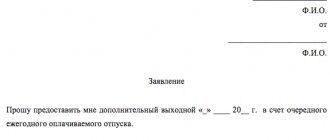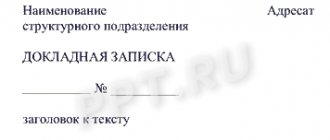Last modified: January 2021
Labor legislation provides for a rule that allows an employer to unilaterally terminate an employment relationship with an employee who is absent from work without a valid reason. The complexity of the procedure involves obtaining an explanation from the employee as to what was the reason for failure to appear and the assessment of the circumstances by management. A notice of dismissal for absenteeism is sent to the truant at the last stage of registration, when the administration has not received an explanatory note or other documents from the person within the established time frame.
When is absence from work considered absenteeism?
Even a single absence is grounds for dismissal, as it is a gross violation of labor discipline.
Taking into account specific circumstances, the manager can apply a more lenient penalty. Dismissal on this basis is provided for in paragraphs. "a" clause 6 of Art. 81 Labor Code of the Russian Federation. According to the definition given in this legal norm, absenteeism is considered absence from the workplace during the entire working day or shift for more than 4 hours in a row without serious reasons. For example, visiting a doctor for a consultation without opening a sick leave certificate is an unjustified reason for leaving the workplace without the employer’s permission. Employees also do not have the right to visit relatives in the hospital during working hours and go on vacations that are not agreed with their superiors.
A number of circumstances under which absence from work is not considered absenteeism are defined by law. There is no clear list, but they can be identified according to individual articles of the Labor Code and based on judicial practice. This:
- disability confirmed by sick leave (Article 81 of the Labor Code of the Russian Federation);
- involvement in public and state duties (summons to law enforcement agencies, to court) (Article 170 of the Labor Code of the Russian Federation);
- blood donation (Article 186 of the Labor Code of the Russian Federation);
- arrest (Appeal ruling of the Altai Regional Court dated December 11, 2013 in case No. 33-9126/2013 and other court decisions);
- emergency circumstances, for example, inability to get there due to flight cancellation or extreme weather, emergency work in the apartment, etc. (Decision of the Altai Regional Court dated August 17, 2011 in case No. 33-7208/11);
- participation in a strike (Article 414 of the Labor Code of the Russian Federation);
- suspension of work due to a delay in wages of more than 15 days (Article 142 of the Labor Code of the Russian Federation).
If an employee proves that his coming to work was prevented by insurmountable circumstances or serious reasons, absenteeism will not be counted even if an absence report is drawn up.
Decision of the Supreme Court of the Russian Federation on the admissibility of warnings about absence from work via SMS
The Supreme Court (SC) of the Russian Federation allowed using an SMS message to warn colleagues and the director about absence from work for serious reasons, while receiving a positive response is not a necessary condition.
If an employee does not come to work, having serious reasons for this, and even took measures to ensure the work process in his absence, such an employee cannot be fired.
Arbitrage practice
In November 2021, the Constitutional Court completed the consideration of the case of a Moscow resident who was fired from Russian Post for absenteeism for an allegedly unexcused reason.
The applicant was urgently forced to go with her minor nephew to the emergency room, as the boy broke his nose while playing on the playground.
The boy's mother, the applicant's sister, could not accompany her son because she was in the hospital after suffering a stroke, and the child had no other relatives. The employee notified her immediate supervisor about the special situation, agreed with her colleague that she would replace her at work, and the next day brought documents from the doctor confirming that the boy had been with a traumatologist for a certain period of time.
But the employee’s immediate supervisor considered these arguments unconvincing, and Russian Post terminated the employment contract with the employee.
The plaintiff went to court, but the judge refused to reinstate her because he considered the evidence of the need for her to be in the hospital with her nephew insufficient . The judge also referred to the fact that the woman did not receive permission to be absent from work from her manager. The Court of Appeal agreed with the colleague's opinion and upheld his decision.
The trial court said that the only fact that should be taken into account is that the woman did not, in accordance with the established procedure, obtain the consent of her manager to miss her shift.
The Constitutional Court ultimately declared such a decision unlawful.
The woman provided the employer with all evidence of a valid reason for absence from work:
- certificates of joint residence in the same apartment with a boy and his seriously ill mother, his own sister;
- certificates from doctors confirming that the boy’s mother is in the hospital;
- documents confirming the child’s injury and his minority.
Plus, the employee found a replacement, so the work process was not affected.
As a result the Supreme Court reinstated the woman in her position and ruled that the need to obtain permission from management to miss work if absence from the workplace is impossible for valid reasons is not necessary - it is enough to notify management via SMS or any other convenient method.
Position of the Constitutional Court of the Russian Federation
The Constitutional Court of the Russian Federation ruled that the employer and the courts must evaluate the totality of all the circumstances of the case, including the objective reasons for the employee’s absence from service (rulings of the Constitutional Court dated February 19, 2009 N75-O, dated September 24, 2012 N1793-O, dated June 24, 2014 N1288-O, dated June 23, 2015 N1243-O, etc.).
The employer himself must provide evidence that clearly shows that the employee committed a gross violation of labor duties (paragraph 38 of the Resolution of the above-mentioned Plenum).
“It is mandatory for the correct resolution of the dispute to establish the circumstances and reasons (whether valid or not) of the employee’s absence from the workplace,” the judge of the Constitutional Court stated.
The court of first instance did not accept any evidence from the dismissed woman and did not consider the motives for her action. This position of the district court did not comply with legal norms and was therefore overturned by the Supreme Court.
Features and design rules
Such a document can be drawn up on a regular A4 sheet or on the organization’s letterhead. You can prepare a convenient template in which you only need to fill in the missing information. You can download one of the possible template options at the bottom of the page.
There is no required form, so the text is modified to suit the situation. However, there are general mandatory rules for formatting texts:
- the act is drawn up in two copies, one of which is given to the employee;
- the paper has a serial number and the exact date of compilation;
- contains information about the employing organization;
- Full name and position of the employee who committed absenteeism;
- Full name and position of the employee who signs the document, thereby certifying the fact of the colleague’s absence;
- the document is given to the employee for signature (if a refusal to sign the document is made, a note about this is made and once again certified by the signatures of witnesses).
The date of preparation does not have to be the day of the truancy itself, but the paper must be drawn up no later than a month after the incident. It is advisable that such a form be signed by at least three employees. In this case, if the case goes to court, the document will have greater legal significance. In addition to the person directly drawing up the act on the employee’s absence from the workplace, two more witnesses put their signatures on the paper.
An employee who has been subject to a penalty based on the act may disagree with it and seek protection in court or the labor inspectorate in order to challenge the very fact of absenteeism. If there are violations when drawing up the act, this may lead to its cancellation. Also, the paper will not be valid if the employee proves a valid reason for absence. The most common mistakes when drawing up a deed:
- evidence of absence for more than 4 hours in a row is not provided (the time of arrival and departure is not indicated, the date of absence is not indicated, there are no signatures of witnesses);
- the document was not handed over to the employee for signature (there is no corresponding note on the refusal of the signature certified by other employees).
An employee’s absence from work report usually contains the following information:
- name of the organization, its location;
- name of the document, its registration number and date of preparation;
- last name, first name, patronymic and position of the document originator;
- Full names and positions of present colleagues who confirm what was written;
- description of the violation, period of absence;
- Full name and position of the culprit;
- certification signatures of witnesses;
- signature of the employee himself, who has read the form and received a copy of it.
After drawing up the act
In the future, if it turns out that the employee did not have valid reasons for absenteeism, these facts are recognized as absenteeism, which entails punishment through an order of disciplinary action, up to and including dismissal. If an employee, having appeared at work, provides the employer with written evidence of valid circumstances of absence from the workplace, then he is released from any liability and legally begins to perform his official duties.
Challenging an employee's absenteeism report
An employee has the right to challenge the actions of his management. If he does not agree with the application of disciplinary punishment, including dismissal, he can appeal it in court. To do this, you need to take several actions:
- Take a copy of the act and dismissal order from management. These documents must be issued without fail, but sometimes management ignores their duty;
- draw up a statement of claim. It is recommended to contact a lawyer, since a correctly drafted application is half the success;
- wait for a summons from the court to set a hearing date;
- appear in court on the specified calendar date, bring evidence that the absence from work was for a valid reason.
Note! You can first file a complaint with the labor inspectorate; they have the authority to cancel the dismissal order. But you need to remember that there is a statute of limitations for such disputes. If you do not go to court within a calendar year after dismissal, the dispute will not be considered.
If the court rules in favor of the dismissed employee, management must reinstate him to his previous position within the working day. Also, the employer will have to pay for forced absenteeism, based on the average earnings of this person. The plaintiff also has the right to demand compensation for moral damage.
Management action in case of absence from work
Having discovered that an employee is absent from work, management should take 3 steps:
- Document the fact of absence or duration of absence.
- Give the truant an opportunity to explain himself. Within two days, the employee must indicate in writing the reason why he violated the routine and provide documents to support his words. If the culprit refuses to write an explanatory note, you should be offered to sign a statement of refusal so that he cannot challenge the administration’s decision. The employee’s refusal to sign and this document must take place in front of witnesses.
- Depending on the reasons for absenteeism, the administration has the right to forget about the incident or prepare an order for disciplinary action.
Who and how draws up an employee’s absence from work report?
An absence from work report must be drawn up in any case. If it turns out that the employee was sick or did not show up for another valid reason, the report is closed. If the absenteeism was not justified, and the management of the enterprise decides to apply sanctions, the document will become the basis for subsequent actions.
The act is drawn up at the truant’s workplace:
- head of a department, sector, site and other unit (a person higher in position);
- accountant, human resources or legal services employee;
- or other authorized person.
Note!
The document is drawn up in the presence of a special commission or in the presence of three witnesses. The filling time and date must be indicated.
Based on the document, the service responsible for recording working hours puts a note in the log book, time sheet or similar document - “NN”, which means that the employee did not show up for an unknown reason. If an employee brings a document confirming the valid reason for missing work, the entry is replaced with the appropriate one, for example, “sick.” If not, absenteeism is recorded.
Sample of filling out a certificate of absence from work
The act can be written by hand or printed on a computer. There is no single form of document; an enterprise has the right to independently draw up forms for filling out acts, or each time draw up a document in any form.
The truancy report must contain:
- Business name;
- document's name;
- date and time of compilation;
- Full name and position of the compilers and details of the truant;
- description of the situation - for example: it was recorded that an employee (full name, position) did not show up for work and did not begin his duties (date and exact time);
- an indication that the truant did not report the reason for his absence.
The document is signed by witnesses and the originator.
The essence of the suspension procedure
An employee has the right to suspend work if the employer delays payment of his salary for a period of more than 15 calendar days (Article 142 of the Labor Code of the Russian Federation, Letter of the Ministry of Labor dated December 25, 2013 No. 14-2-337). The presence or absence of the employer’s guilt in the delay does not matter for this situation (clause 57 of the Resolution of the Plenum of the Supreme Court of the Russian Federation dated March 17, 2004 No. 2). In particular, this right can be used by persons on a business trip (Letter of the Ministry of Labor dated August 18, 2017 No. 14-2/B-761).
The use of this method of influencing the employer is not mandatory for the employee. A decision on it can be made on any of the days between the 15th day of delay in payment and the day of transfer of the delayed funds. The employer must be notified of this decision in writing. The method of sending such a notice is not regulated by law.
The right to suspend work cannot be used (Article 142 of the Labor Code of the Russian Federation):
- during periods of special situations - military, emergency or the introduction of special measures;
- in military and paramilitary structures responsible for ensuring the security of the state and preventing (liquidating) emergency situations on its territory;
- civil servants;
- in organizations servicing particularly hazardous types of production or equipment;
- workers of life support structures for the population (water, heat, gas, electricity, communications, ambulance and emergency medical care).
Possible reasons
The key problem in how to fire a person if he does not show up for work is proving that the reason for his absence is not valid. Proving this falls entirely on the shoulders of the employer. Whether the reason is acceptable or not is also decided by the employer, since there are no such criteria in the Labor Code.
If there is no proof of valid reasons, then you can already think about how to fire an employee if he does not go to work. However, it is not recommended to start this procedure before the state of affairs is really clarified, since the dismissed person can go to court and win it. In his place, you can temporarily hire a person on a fixed-term contract with the appropriate mark.
Publications
The Supreme Court (SC) of the Russian Federation allowed to warn superiors about absence from work via SMS message, while receiving a positive response is not fundamental. If an employee did not come to work for a good reason, and even took measures to ensure the work process in his absence, then such an employee cannot be fired, the highest authority indicates.
The Supreme Court emphasizes that dismissal is a last resort: even with absenteeism for an unexcused reason, before terminating the contract, it is necessary to take into account the behavior of the employee as a whole and his attitude towards work.
The crux of the matter
A resident of Moscow, who was fired for absenteeism without a good reason, reached the highest authority with a complaint against Russian Post. The applicant noted that she was unable to go to work because she was in the hospital with her minor nephew, who had broken his nose while playing hockey. At the same time, the employee sent an SMS message to the manager about her absence, asked a colleague to replace her, and subsequently submitted medical documents to work.
Nevertheless, Russian Post terminated the employment contract with the plaintiff.
The Babushkinsky Court of Moscow and the Moscow City Court refused to reinstate the applicant at work.
The court of first instance found that the plaintiff did not present evidence confirming the need for her to be in the hospital with her nephew. He also referred to the lack of evidence of the manager’s consent to the applicant missing a work shift.
According to the district court, the post office employee’s agreement with her colleague about a replacement does not indicate that she did not commit absenteeism, since the plaintiff was absent from work without good reason and without the permission of the manager.
The appellate court agreed with these findings.
Position of the Armed Forces
The Labor Code allows an employer to fire an employee for absenteeism without good reason, since this is a gross violation. However, when imposing a disciplinary sanction, the severity of the offense committed and the circumstances under which it was committed must be taken into account (Part 5 of Article 192 of the Labor Code of the Russian Federation).
The courts, when checking the legality of the employer’s actions, should not act arbitrarily, but proceed from the general principles of legal, and therefore disciplinary liability, in particular, such as fairness, proportionality, legality. The courts need to evaluate the entirety of the specific circumstances of the case, including the reasons for the employee’s absence from work (rulings of the Constitutional Court of February 19, 2009 No. 75-0-0, of September 24, 2012 No. 1793-0, of June 24, 2014 No. 1288-0, dated June 23, 2015 No.1243-0, etc.).
In this case, the obligation to prove the existence of a legal basis for dismissal and compliance with the established procedure for dismissal rests with the employer (paragraph 23 of the resolution of the Plenum of the Supreme Court of March 17, 2004 No. 2).
It is the employer who is obliged to provide evidence indicating that the employee committed one of the gross violations of labor duties (paragraph 38 of the resolution of the same Plenum).
“It is mandatory for the correct resolution of a dispute to establish the circumstances and reasons (whether valid or not) for the employee’s absence from the workplace,” reminds the Supreme Court.
In this case, the trial court erroneously believed that what mattered primarily was whether or not the employee received the manager’s consent to miss her shift.
Such a conclusion cannot be recognized as legitimate, since it was made in violation of the rules of procedural law and contradicts the materials of the case, the Supreme Court believes.
As follows from the case materials, the plaintiff explained to the employer, as well as in court hearings, that there were valid reasons for absence from work - due to the need to be with her nephew in the hospital.
She indicated that she lives together with her sister and her son, they are members of the same family and run a common household. The applicant is directly involved in the life and upbringing of her nephew: she takes him to school and sports clubs, and walks with him.
On the day of the alleged absence, the plaintiff’s sister went to the hospital to visit their mother, who had suffered a stroke. And the nephew was playing hockey with friends in the yard; during the match, he suffered a broken nose, and the woman took him to the emergency room, from where the child was hospitalized. Naturally, the relative went to the hospital with the child.
At the same time, she sent an SMS message to the manager that she would not be able to go to work on her shift, but another employee would replace her.
According to the plaintiff, this method of notification was the established practice among post office employees.
Thus, the employee believed that she had taken all measures to notify the employer of her absence from work and to ensure the operation of the post office, the Supreme Court points out.
The colleague who replaced the plaintiff also said that she warned the deputy manager that she would work the shift for her. She was unable to reach her immediate superior by phone.
There are no instructions on how to notify the manager about absence from work at the post office, but there is an established procedure for calling the boss and explaining the situation, the witness said.
The court of first instance, making a decision to reject the claim, partially setting out the circumstances of the case in the text of the decision, rejected the applicant’s arguments without giving reasons, and justified its conclusion that there were no valid reasons for missing work only by the fact that there was evidence of obtaining the manager’s consent to absenteeism. She did not present the change to the court.
This position of the district court does not comply with legal norms, the Supreme Court believes.
In his opinion, the court, for example, should have questioned the deputy head of the postal service department, whom the witness notified about the plaintiff’s absence from work.
The appellate court did not correct this error.
At the same time, the content of the appeal ruling does not correspond to the case materials: it states that the prosecutor gave an opinion on the legality and validity of the decision of the first instance court, while from the record of the court session it follows that the prosecutor gave an opinion on the illegality and groundlessness of the plaintiff’s dismissal from work and the existence of grounds to satisfy claims.
Equality, proportionality, humanism
“The court, which is the body for resolving individual labor disputes, by virtue of Part 1 of Article 195 of the Code of Civil Procedure of the Russian Federation must make a lawful and justified decision, a circumstance that is significant for the correct consideration of cases of challenging a disciplinary sanction or reinstatement at work and subject to proof by the employer is compliance when applying a disciplinary sanction to an employee arising from Articles 1, 2, 15, 17, 18, 19, 54 and 55 of the Constitution of the Russian Federation and the general principles of legal and, consequently, disciplinary responsibility recognized by Russia as a rule of law state, such as justice, equality, proportionality, legality, guilt, humanism. For these purposes, the employer must provide evidence indicating not only that the employee committed a disciplinary offense, but also that when imposing a penalty, the severity of this offense and the circumstances under which it was committed were taken into account (Part 5 of Article 192 of the Labor Code), as well as the employee’s previous behavior and attitude towards work. If, when considering a case for reinstatement at work, the court comes to the conclusion that misconduct actually occurred, but the dismissal was made without taking into account the above circumstances, the claim may be satisfied (paragraphs two, three, four of paragraph 53 of the resolution of the Plenum of the Armed Forces of the Russian Federation dated March 17, 2004 No. ),” emphasizes the Armed Forces.
In violation of the above provisions, the courts ignored the fact that the defendant did not provide evidence indicating that when making the decision to dismiss, the severity of the disciplinary offense charged to her and the circumstances under which it was committed were taken into account, as well as the fact that the defendant took into account previous behavior employee and her attitude to work. The courts of first and appellate instances did not examine the possibility of the defendant applying another, less severe type of disciplinary sanction.
In such circumstances, the conclusions of the courts that the employer had grounds for dismissal for absenteeism are unlawful; they were made with the incorrect application of the rules of substantive law and in violation of the rules of procedural law: the courts did not determine the circumstances relevant to the case, and then, which party should prove them, did not establish these circumstances, did not evaluate the totality of the evidence available in the case.
The courts have formally approached the consideration of this case related to violation of labor rights, which is unacceptable when resolving a dispute of this category, the Supreme Court emphasizes.
He overturned the decision of the Babushkinsky Court of Moscow and the appeal ruling of the Moscow City Court and returned the case for a new trial in the first instance.
Alice Fox
What is considered truancy?
Absenteeism may be grounds for dismissal.
Subparagraph “a” of paragraph 6 of part 1 of Article 81 of the Labor Code of the Russian Federation defines this concept. Truancy is considered:
- leaving an employee's workplace for 4 hours or more;
- absence from duty.
Paragraph 39 of the Resolution of the Plenum of the Supreme Court of the Russian Federation dated March 17, 2004 No. 2 provides a more specific list. It is allowed to dismiss an employee for:
- absenteeism ;
- absence of an employee from the workplace for more than four hours in a row during the day;
- leaving work early if a fixed-term employment contract is concluded;
- leaving the workplace earlier than the date specified in the warning about early termination of the contract;
- unauthorized leave or vacation.
The reason for absence during the working day does not have to be valid. At this time, the citizen does not perform official duties, therefore his actions are considered a disciplinary offense. They entail punishment ranging from a simple reprimand to dismissal.
Example. Citizen S. was fired for absenteeism from the Federal State Institution “UVO VNG RF in the Republic of Sakha (Yakutia)”. Having disagreed with the employer’s decision, she filed an appeal to the court for reinstatement.
The court examined the case materials and found that the plaintiff was granted paid leave. Subsequently, the vacation was extended due to sick leave.
The FSS revealed as a result of an inspection that the certificates of incapacity for work were filled out with violations. They were re-registered for a shorter period.
The employer established that S. provided fictitious sick leave certificates. He considered part of the period of absence from work to be absenteeism.
The court agreed with the employer’s arguments and refused reinstatement (Appeal ruling of the Supreme Court of the Republic of Sakha (Yakutia) dated February 12, 2018 in case No. 33-557/2018).
Dismissal as a disciplinary sanction
Absenteeism is a serious disciplinary violation. If an employee does not show up for work and does not communicate, management decides how to fire him and what to do. The penalty for absenteeism is unilateral termination of the contract. The procedure must be completed within a month, and the period is counted from the last day of the disciplinary violation. This period may be extended for the period of sick leave.
Before dismissal, you should send a letter to an employee who does not show up for work. If the person has not provided an explanation, then the problem of how to fire an employee for absenteeism if he does not come to work will be solved. You can carry out the procedure without any fear.
Consequences of absenteeism
According to Article 21 of the Labor Code of the Russian Federation, employees are required to follow the internal labor regulations. Violation of them entails disciplinary liability. Such a gross violation as truancy, according to the law, may entail:
- comment;
- rebuke;
- dismissal.
In addition, skimping on labor discipline, schedule and job responsibilities gives the employer the right to deprive the employee of bonuses. The Labor Code does not imply the imposition of additional penalties.










